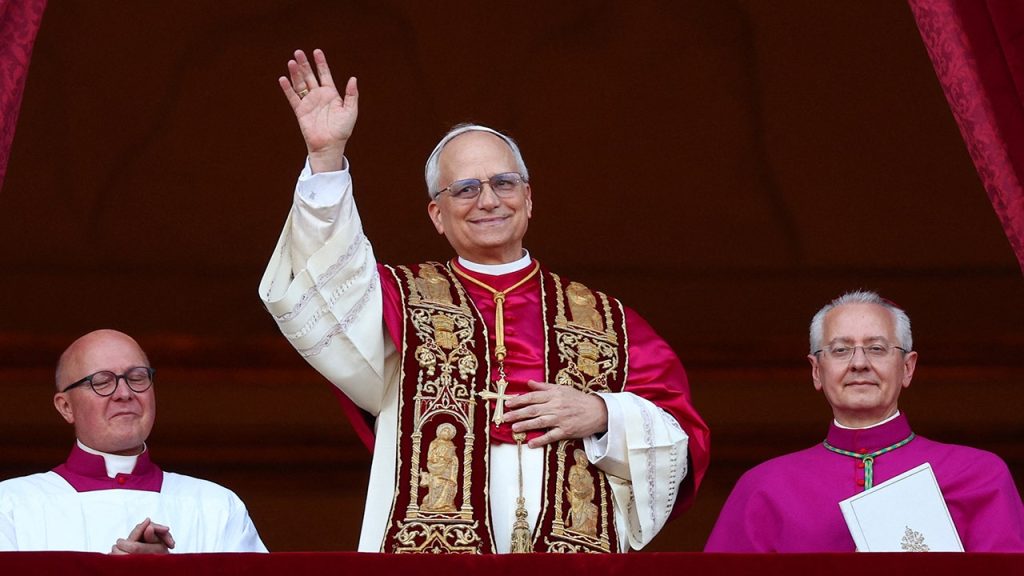In a historic event that captivated the global Catholic community, Cardinal Robert Francis Prevost has been elected as the first American Pope, taking the name Pope Leo XIV. Welcomed by thousands in St. Peter’s Square, the new pontiff addressed the faithful in both Italian and Spanish, emphasizing themes of inclusivity and a synodal church. His initial remarks reflect a commitment to continue the legacy of his predecessor, Pope Francis, who prominently advocated for a more inclusive church.
| Article Subheadings |
|---|
| 1) Cardinal Prevost Ascends to the Papacy |
| 2) Key Themes from His Inaugural Speech |
| 3) The Significance of Pope Leo XIV’s Name |
| 4) Responses to His Election |
| 5) Future Directions for the Papacy |
Cardinal Prevost Ascends to the Papacy
On May 8, 2025, a significant moment unfolded as Cardinal Robert Francis Prevost was elected as Pope Leo XIV, marking a historical first as the first American pontiff. The ceremony took place in the iconic St. Peter’s Square, filled with a jubilant crowd that came to witness the unveiling of their new spiritual leader. Prevost, who was appointed as a cardinal by Pope Francis in 2023, is known for his extensive service within the Catholic Church and his leadership in various capacities. His election has generated widespread attention and has been perceived as a turning point for the papacy, especially within American and global Catholic circles.
Key Themes from His Inaugural Speech
In his inaugural address, Pope Leo XIV emphasized the importance of unity and collective faith, stating, “To all you brothers and sisters of Rome, Italy, and the world, we want to be a synodal church.” This declaration sets the stage for his papacy, aimed at fostering inclusivity and compassion within the Church. Experts interpret this move as a continuation of Pope Francis’s legacy, which championed a more inclusive, open, and engaging church.
“He mentioned being a missionary church that includes all people, and that comes right out of Pope Francis,”
noted Dennis Doyle, a professor emeritus at the University of Dayton. Doyle’s insights highlight how Pope Leo XIV intends to build upon the foundational ethos of his predecessor.
The Significance of Pope Leo XIV’s Name
Choosing the papal name “Leo” carries profound historical significance. The name has been historically associated with strong leadership within the Catholic Church, most notably associated with Pope Leo the Great and Pope Leo XIII. The choice suggests a desire for a thoughtful, balanced approach, especially regarding social and economic issues affecting the global populace. According to Doyle, “Everybody’s looking first to Leo XIII,” pointing to the expectations surrounding Pope Leo XIV’s stance on critical social issues. As the modern world grapples with economic upheaval, the symbol of the name Leo resonates with many who recall its association with social progress and reform.
Responses to His Election
The election of Pope Leo XIV has been met with varied responses. While many have embraced the new pope’s inclusive tone, some conservative factions within the Church, particularly those aligned with the ‘America First’ ideology, have expressed apprehension. The inclusivity emphasized by the new pontiff is seen as potentially conflicting with their traditional views.
“In some ways, maybe he’s going to be different from Francis,”
noted Doyle, hinting at potential challenges ahead for the new pontiff as he navigates various ideological landscapes within the Church. However, numerous leaders across the United States have lauded the election, viewing it as an opportunity for renewal and growth.
Future Directions for the Papacy
Looking forward, Pope Leo XIV is expected to blend traditional values with a progressive vision. His background as prefect of the Dicastery for Bishops and his extensive experience in various capacities within the Church position him uniquely to address current global challenges. Notably, his decisions regarding residence—the papal apartments traditionally used by popes—will serve as an early indicator of his approach to tradition and modernity. Unlike his predecessor, who broke from tradition by choosing to reside elsewhere, Pope Leo XIV’s choices will evolve as he establishes his identity in the papacy.
| No. | Key Points |
|---|---|
| 1 | Pope Leo XIV is the first American pope, marking a significant milestone for the Catholic Church. |
| 2 | His inaugural speech emphasized unity, inclusivity, and the importance of a synodal church. |
| 3 | The name “Leo” reflects historical significance associated with strong leadership in the Church. |
| 4 | Responses to his election are mixed, with conservative factions expressing caution. |
| 5 | Pope Leo XIV is expected to balance traditional values with a progressive vision in his leadership. |
Summary
The election of Pope Leo XIV heralds a new chapter in the Catholic Church, with the first American pope taking office amidst a changing global landscape. His commitment to inclusivity, alongside a balance of tradition and innovation, will be closely observed as the Church navigates complex social issues in the coming years. The implications of his leadership extend beyond Rome, fostering hope among various factions of the Church and providing a platform for renewal in the faith community.
Frequently Asked Questions
Question: Who is Pope Leo XIV?
Pope Leo XIV is the first American pope, elected on May 8, 2025, following the death of Pope Francis.
Question: What themes did Pope Leo XIV emphasize in his inaugural speech?
He emphasized unity, inclusivity, and the importance of a synodal church, aiming to continue the legacy of his predecessor, Pope Francis.
Question: What is the significance of the name “Leo” for the new pope?
The name “Leo” is historically significant, associated with strong leadership and social justice within the Church, notably reflecting the legacies of Pope Leo the Great and Pope Leo XIII.
